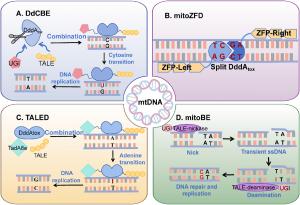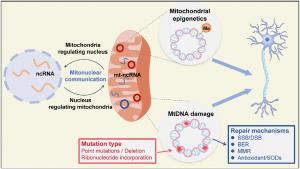
Mitochondrial DNA Editing: A Breakthrough in Tackling Neurodegenerative Diseases
SHANNON, CLARE, IRELAND, May 12, 2025 /EINPresswire.com/ --
Mitochondrial DNA (mtDNA) editing has emerged as a revolutionary approach in the fight against neurodegenerative diseases (NDDs). As these diseases continue to impose a significant global health burden, the innovative use of mitochondrial gene editing offers a promising avenue to address their underlying causes. The dysfunction of mitochondria, triggered by mutations in mtDNA, is now recognized as a pivotal factor contributing to the development of several debilitating conditions, including Parkinson’s disease (PD), Alzheimer’s disease (AD), Huntington’s disease (HD), and Amyotrophic Lateral Sclerosis (ALS).
Mitochondria are essential for cellular energy production and play a crucial role in maintaining neuronal health. Mutations in mitochondrial DNA disrupt this balance, leading to oxidative stress, impaired energy metabolism, and ultimately neurodegeneration. Traditional therapeutic approaches have been limited by the challenges of directly targeting mtDNA. However, recent advancements in mitochondrial gene editing technologies are overcoming these barriers.
Among the most promising tools are nuclease-based systems like mitoZFN and mitoTALEN, which can target and eliminate mutant mtDNA. Additionally, base editing systems such as DdCBE and TALED enable precise modifications at specific mtDNA sites without introducing double-strand breaks. These advanced techniques reduce the proportion of mutated mtDNA, thereby restoring the wild-type mitochondrial population and alleviating disease symptoms.
Despite these advancements, one of the primary challenges remains the efficient delivery of gene-editing tools to the mitochondria. To address this, researchers are employing innovative delivery vectors, including viral-based systems like adeno-associated viruses (AAVs) and non-viral vectors such as lipid nanoparticles. These strategies aim to improve the targeted delivery and sustained expression of editing components, crucial for therapeutic efficacy.
The application of mitochondrial DNA editing has shown potential in animal models for reducing disease-related mutations and restoring normal mitochondrial function. As these techniques evolve, they may pave the way for personalized gene therapies that can precisely address the genetic variability seen in patients with NDDs. Moreover, ongoing research aims to refine these methods to minimize off-target effects and ensure long-term safety.
By focusing on the genetic roots of neurodegenerative diseases, mitochondrial DNA editing represents a shift in therapeutic strategies. As this field continues to advance, it holds the potential to offer long-lasting solutions for conditions that currently lack effective treatments.
# # # # #
Genes & Diseases publishes rigorously peer-reviewed and high quality original articles and authoritative reviews that focus on the molecular bases of human diseases. Emphasis is placed on hypothesis-driven, mechanistic studies relevant to pathogenesis and/or experimental therapeutics of human diseases. The journal has worldwide authorship, and a broad scope in basic and translational biomedical research of molecular biology, molecular genetics, and cell biology, including but not limited to cell proliferation and apoptosis, signal transduction, stem cell biology, developmental biology, gene regulation and epigenetics, cancer biology, immunity and infection, neuroscience, disease-specific animal models, gene and cell-based therapies, and regenerative medicine.
Scopus CiteScore: 7.3
Impact Factor: 6.9
# # # # # #
More information: https://www.keaipublishing.com/en/journals/genes-and-diseases/
Editorial Board: https://www.keaipublishing.com/en/journals/genes-and-diseases/editorial-board/
All issues and articles in press are available online in ScienceDirect (https://www.sciencedirect.com/journal/genes-and-diseases ).
Submissions to Genes & Disease may be made using Editorial Manager (https://www.editorialmanager.com/gendis/default.aspx ).
Print ISSN: 2352-4820
eISSN: 2352-3042
CN: 50-1221/R
Contact Us: editor@genesndiseases.com
X (formerly Twitter): @GenesNDiseases (https://x.com/GenesNDiseases )
# # # # # #
Reference
Ye Hong, Ying Song, Wenjun Wang, Jinghui Shi, Xi Chen, Mitochondrial DNA editing: Key to the treatment of neurodegenerative diseases, Genes & Diseases, Volume 12, Issue 4, 2025, 101437, https://doi.org/10.1016/j.gendis.2024.101437
Funding Information:
Zhejiang Provincial Natural Science Foundation of China LD22H090002
National Natural Science Foundation of China 82174038
horizontal scientific research project of Zhejiang University of Technology (China) KYY-HX-20180348
Genes & Diseases Editorial Office
Genes & Diseases
+86 23 6571 4691
editor@genesndiseases.com
Distribution channels:
Legal Disclaimer:
EIN Presswire provides this news content "as is" without warranty of any kind. We do not accept any responsibility or liability for the accuracy, content, images, videos, licenses, completeness, legality, or reliability of the information contained in this article. If you have any complaints or copyright issues related to this article, kindly contact the author above.
Submit your press release


